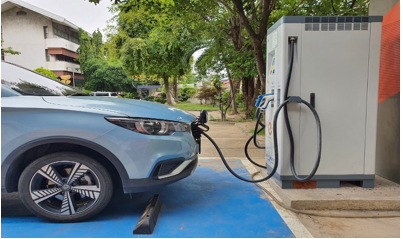i INP-WEALTHPK
Amir Saeed
Lowering power tariffs for EV charging stations is a transformative step towards accelerating electric vehicle adoption, aiming to significantly cut oil imports and promote sustainable mobility through enhanced infrastructure and green financing initiatives.

Talking to WealthPK, Dr Khalid Waleed, research fellow at the Sustainable Policy Development Institute (SDPI), highlighted the economic implications of this transition, noting that Pakistan’s monthly oil imports total approximately $1 billion. By achieving a 30% reduction in imports through increased EV adoption, the country can save $300 million monthly, translating to annual savings of $3.6 billion.
Those potential savings are comparable to the last Stand-By Arrangement approved by the International Monetary Fund (IMF). The government has reduced the electricity tariff for charging stations by 45% from Rs71.10 to Rs39.70 per unit. This reduction is aimed at lowering operational costs for charging station operators and promoting the establishment of more charging infrastructure across the country. Dr Waleed emphasized that transitioning 50-60% of two- and three-wheelers to electric models is essential for realizing these savings.
He also emphasized strategic categorization of vehicles into luxury and necessity segments, urging a focus on affordable transport options like two-wheelers and public transit systems. To facilitate this shift, he suggested implementing distributed solar systems for EV charging at homes, which would help manage grid demand and utilize excess solar energy effectively. This decentralized approach not only optimizes renewable energy use but also supports a sustainable transition to electric mobility.
“This approach would help manage the rise in net metering by reducing the amount of electricity fed to the grid, while utilizing excess solar energy for EV charging. By optimizing the use of renewable energy at the local level, it would reduce dependency on the national grid. Channelling solar power into EV charging makes the system more decentralized and efficient, supporting a sustainable transition to electric mobility.’’
“For mass transit solutions, charging infrastructure should be established at major bus stations to support two- and three-wheeler transporting passengers to and from these stations. This would ensure that these vehicles can easily charge while serving commuters,’’ he suggested. “Additionally, electric buses should be introduced for long-haul routes, providing an eco-friendly alternative for passengers traveling on extended journeys.
This can be achieved by developing distributed generation facilities along highways, using small solar plants to generate power locally, rather than relying solely on grid connections. This decentralized approach would enhance energy sustainability and ensure reliable charging for mass transit vehicles.” He added that the tariff structure should incentivize daytime charging by offering lower rates when solar energy is abundant, while higher rates could apply during night-time when reliance on the grid increases.
This strategy would not only reduce night-time travel but also potentially decrease accident rates. “The government should adopt a regulatory approach similar to that used for the compressed natural gas (CNG) without direct investment, focusing instead on regulatory incentives and establishment of distributed generation facilities along highways.” Talking to WealthPK, Aatizaz Hussain, a development economic researcher at the National Defence University (NDU) Islamabad, highlighted that tariff reduction is a crucial step towards fostering EV adoption.
By making it more affordable to operate the charging stations, this initiative is poised to improve access for consumers and encourage local entrepreneurs to invest in charging infrastructure. “The introduction of a simplified e-portal system for approvals will further empower businesses to establish charging stations, thereby expanding the network necessary for widespread EV usage.’’ Moreover, Hussain pointed out that focusing on green financing will bolster the development of affordable clean energy solutions, positioning the nation as a regional leader in sustainable energy practices.
This aligns with the broader objectives of reducing reliance on imported fossil fuels and enhancing urban air quality. “Overall, these measures reflect a comprehensive strategy aimed at promoting electric mobility in the country while addressing economic challenges related to fuel imports and environmental concerns. The government’s commitment to creating an enabling environment for EV adoption through regulatory incentives and infrastructural support marks a significant step towards achieving its goal of having 30% of vehicles run on electricity by 2030.’’
Credit: INP-WealthPk









